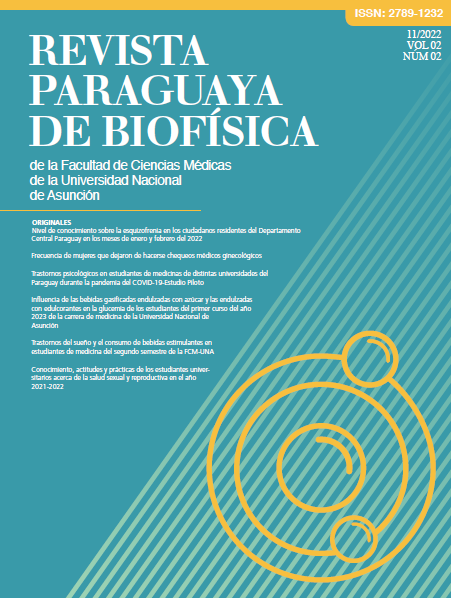Level of knowledge about schizophrenia among citizens residing in the Central Paraguay Department in January and February 2022
Keywords:
Schizophrenia, neurological disorder, prejudice, disabilityAbstract
Introduction: Schizophrenia is a serious disorder of the neurological system, which lasts a lifetime and affects the person‘s thoughts, behavior and feelings. It is of utmost importance to know about this disease since it could be an impediment to maintain a normal life, to work and many times to take care of oneself, if it is not treated. There is a great lack of information about schizophrenia, neither the people who suffer from this disease, nor the family members themselves can come to fully understand some of the characteristics of this disease.
General objective: To establish the characteristics of the population and determine the knowledge of the citizens of the central department about schizophrenia.
Materials and Methods: The design was observational, analytical, cross-sectional and cross-sectional. The population studied was 206 citizens of both sexes over 18 years of age, during the months of January and February 2022. A non-probabilistic sampling was performed applying the descriptive and inferential variable, to relate the variables the Chi2 test was used with a confidence level of 95% and will be considered statistically significant with a p<0.05. The statistical program Epiinfo v7.2 was used.
Results: The responses of 250 people who participated in the survey were analyzed, of which 175 (70%) were women. The most frequent profession among the respondents was student 136 (50.4 %), followed by businessman 36 (14.40 %). The most frequent age range was 18 to 29 years. The respondents answered about the knowledge of schizophrenia of which 206/250 (83.06%) know it, mentioning that 61.1% knew hallucinations and delusions as the most frequent symptoms and it was found that the reason for rejection of 83% of the respondents is due to a lack of information about mental illness.
Downloads
References
(1) Chuaqui Jorge. El estigma en la esquizofrenia. Ciencias Sociales Online, Marzo 2005, V II, No. 1 (45 - 66). https://www.academia.edu/download/33806040/esquizofrenia.pdf.
(2) Eliana Taborda Zapataa, Laura Elisa Montoya Gonzalez, Natalia María Gómez Sierrac, Laura María Arteaga Morales y Oscar Andrés Correa Rico. Manejo integral del paciente con esquizofrenia: más allá de los psicofármacos. Revista colombiana de Psiquiatría. 20016. Disponible en: http://www.scielo.org.co/pdf/rcp/v45n2/v45n2a09.pdf.
(3) Mascayano Tapia Franco, Lips Castro Walter, Mena Poblete Carlos, Manchego Soza Cristóbal. Estigma hacia los trastornos mentales: características e intervenciones. Salud Ment [revista en la Internet]. 2015 Feb [citado 2021 Abr 09]; 38( 1 ): 53-58. Disponible en: http://www.scielo.org.mx/scielo.php?script=sci_arttext&pid=S0185-33252015000100008&lng=es.
(4) Loch, Alexandre Andrade, Hengartner, Michael Pascal, Guarniero, Francisco Bevilacqua, Lawson, Fabio Lorea, Wang, Yuan-Pang, Gattaz, Wagner Farid y Rössler, Wulf. (2011). O estigma atribuído pelos psiquiatras aos indivíduos com esquizofrenia. Archivos de Psiquiatría Clínica (São Paulo) , 38 (5), 173-177. https://dx.doi.org/10.1590/S0101-60832011000500001.
(5) García González Raquel. García Medina Pablo. Ramos Pérez Concepción Cristina. ESTIGMA SOCIAL Y AUTOESTIGMA EN LA ESQUIZOFRENIA. Facultad de Psicología y Logopedia .2018/2019. Recuperado 8 de abril del 2021 https://riull.ull.es/xmlui/bitstream/handle/915/14585/Estigma%20Social%20y%20Autoestigma%20en%20la%20Esquizofrenia.pdf?sequence=1.
(6) Saiz Ruiz Jerónimo, Vega Sánchez Diego C. de la, Sánchez Páez Patricia. BasesNeurobiológicas de la Esquizofrenia. Clínica y Salud [Internet]. 2010 [citado2021 Abr 10] ; 21( 3 ): 235-254. Disponible en: http://scielo.isciii.es/scielo.php?script=sci_arttext&pid=S1130-52742010000300004&lng=es.
(7) Mascayano Tapia Franco, Lips Castro Walter, Mena Poblete Carlos, Manchego Soza Cristóbal. Estigma hacia los trastornos mentales: características e intervenciones. Salud Ment [revista en la Internet]. 2015 Feb [citado 2021 Abr 09] ; 38( 1 ): 53-58. Disponible en: http://www.scielo.org.mx/scielo.php?script=sci_arttext&pid=S0185-33252015000100008&lng=es.
(8) Hugo Selma Sánchez. Neuropsicología de la esquizofrenia. Cuad. neuropsicol. v.2 n.2 Santiago nov. 2008. Disponible en: http://pepsic.bvsalud.org/scielo.php?script=sci_arttext&pid=S0718-41232008000200002&lng=pt&tlng=es.
(9) Chang Paredes Niurka. De la Caridad Ribot Reyes Victoria. Pérez Fernández. Viviana. Influencia del estigma social en la rehabilitación y reinserción social de personas esquizofrénicas. Revista Habanera de Ciencias Médicas . Recuperado el 8 de abril de 2021 http://scielo.sld.cu/scielo.php?script=sci_arttext&pid=S1729-519X2018000500705.
(10) Hugo Selma Sánchez. Neuropsicología de la esquizofrenia. Cuad. neuropsicol. v.2 n.2 Santiago nov. 2008. Disponible en: http://pepsic.bvsalud.org/scielo. php?script=sci_arttext&pid=S0718-41232008000200002&lng=pt&tlng=es.
(11) Niurka Chang Paredes, Victoria de la Caridad Ribot Reyes, Viviana Pérez Fernández, Influencia del estigma social en la rehabilitación y reinserción social de personas esquizofrénicas, Revista Habanera de Ciencias Médicas, vol. 17, núm. 5, pp. 705-719, 2018.
Downloads
Published
How to Cite
Issue
Section
License
Copyright (c) 2023 Zaira Araceli Guillén, Carlota María Martin, Tamara Concepción Villagran, María Paz Zarate, María Eugenia Acosta, Laura Aria

This work is licensed under a Creative Commons Attribution 4.0 International License.





